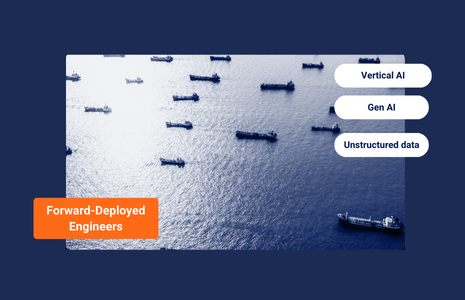How dark activity insights reduce investigation time

What’s inside?
Dark activity can be tricky to decipher. With thousands of daily AIS gaps, identifying true risk can take extensive resources and time. With Windward’s dark activity insights, our customers don’t get flooded with alerts or confusing data. In this blog, I’ll walk through just how this works and why detecting high-risk dark activity doesn’t have to be such a headache.
AIS data shows us where ships are, have been, and will be. It’s become a crucial tool for government authorities and companies in maritime trade such as traders, banks, shipowners in the war against illicit trade and financial crime. As a result, criminals and sanctions evaders have resorted to disabling their AIS to conceal their activities. This tactic has become so prevalent that authorities such as the UN, multiple U.S. agencies, and the UK treasury are recommending companies add AIS monitoring to their due diligence procedures.
The next generation of dark activity insights
Windward pioneered dark activity algorithms precisely calibrated to filter out AIS lost signals and flag deliberate AIS disablement. With the next generation of dark activity algorithms, our customers can access an additional layer of automatically generated insights, including a list of feasible port calls a vessel could have made during the dark activity and the potential window of time a ship was in port.
These dark activity insights enable our customers to accurately zoom in on potential hidden port calls, quickly assess each possibility for different risks and prioritize resources for further investigations.
Investigating concealed port calls
Let’s walk through a typical example to see what this means for our users. A VLCC crude oil tanker stops transmitting AIS in the middle of the gulf. Windward’s dark activity AI algorithm determined this was a deliberate AIS turn-off. By the time it reappears, there are 70 hours unaccounted for.

Where did it go during this time? Within the radius of where it could have gone during the unaccounted for time, there are 44 ports.

The question is how many are actual possibilities? By analyzing the location, unaccounted for time, ship’s operating pattern, nearby port profiles, and other parameters Windward identified four ports as the only ones that could have loaded or unloaded at.

By automatically reducing the number of feasible port calls from 44 to 4 the team investigating this incident cut their time and effort by more than 10X.
Vessel tracking weaknesses
The downsides of relying solely on AIS to track vessels are clear. An analysis of Venezuelan oil trade reveals there may be 3X as many tankers transporting Venezuelan crude and oil products bound for Venezuela than visible through standard tracking tools. Meanwhile, criminals are constantly developing new and more sophisticated tactics. For example, there are other ways AIS is vulnerable to manipulation other than simply turning it off — such as identity tampering.
But even when AIS data is complete, vessel tracking can only answer where a ship was. It cannot tell you what it was doing, who it was trading with, and most importantly, does it pose a risk to your business? This is especially true as Ship-to-Ship transfers at sea emerge as a common deceptive shipping practice. A robust “ Know Your Vessel” (KYV) process is much more than vessel tracking.

The secret sauce to dark activity insights
Traditional matching tools and vessel tracking are still the foundations of managing maritime risk, but to keep up with the growing sophistication of bad actors, companies, and government agencies are moving to solutions that incorporate AI and domain expertise. These solutions can detect events like ship-to-ship meetings with high-risk counterparties, uneconomic behavior, and anomalies – like sudden course deviations and flag hopping.
And staying ahead will require even more innovation. That’s why Windward is continuously adding additional sets of data to better train our maching learning models on the latest trends and tactics.
Cargo and RF signal data, satellite imagery, and behavorial analytics all play a role in giving our customers a more complete and dynamic understanding of their exposure to risk. With these insights, they make faster and more informed decisions.
Key takeaways
- AIS disablement is the #1 method that criminals use to conceal illicit activities and port calls
- Dark activity insights enables 10X more efficient investigations of AIS disablement events
- To see through deceptive shipping practices and overcome the limitations of vessel tracking organizations are turnings to AI tools fusing multiple sources of data










